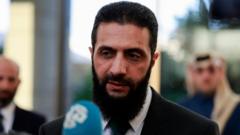Syria’s political landscape is undergoing significant changes following the recent fall of Bashar al-Assad’s regime, with rebel leader Ahmed al-Sharaa indicating a lengthy timeline for new elections in the country. In an interview with Al Arabiya, a Saudi state broadcaster, he discussed the necessity of substantial reforms and provided insights into the process he believes is essential for legitimate governance in Syria.
Sharaa, who leads the newly formed authorities from the Hayat Tahrir al-Sham (HTS) group, suggested that drafting a new constitution could span up to three years, while a comprehensive population census would be crucial for electoral legitimacy. He expressed that it might take an additional year for Syrians to witness significant improvements in public services after the regime's collapse.
Previously known as Abu Mohammed al-Jolani, Sharaa has indicated a shift away from HTS's earlier jihadist influences, stating that the group would be "dissolved" during an imminent national dialogue conference. He stressed that this upcoming gathering represents a critical opportunity to unify the diverse ethnic and religious groups comprising Syria.
In response to concerns regarding the transitional government, Sharaa defended the appointments made as essential, asserting that they were not intended to exclude any groups. Meanwhile, the assurance for protecting minority rights remains a priority for HTS, which has historically faced criticism for its extremist affiliations.
The current dynamics in Syria also involve a crackdown on Assad loyalists, with reports from the UK-based Syrian Observatory for Human Rights indicating that nearly 300 individuals have been arrested recently, including former soldiers and informants collaborating with the previous regime.
Sharaa’s comments reflect a cautious optimism about Syria’s future, but the path towards genuine change appears fraught with challenges as the nation seeks new political leadership amid ongoing confrontations and historical divisions.


















